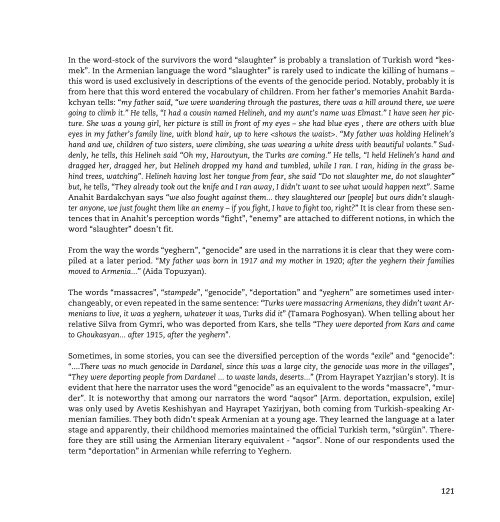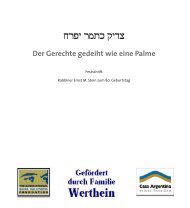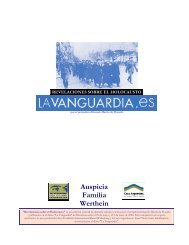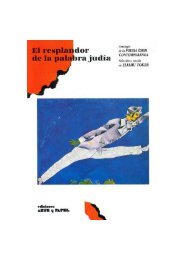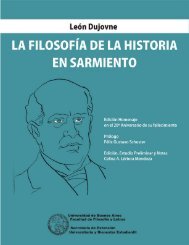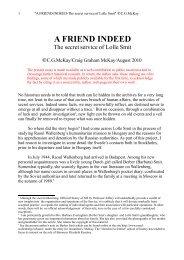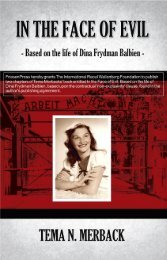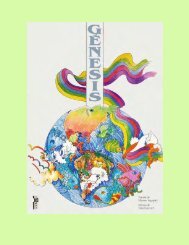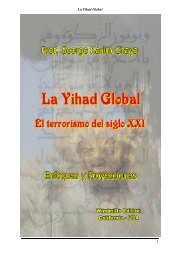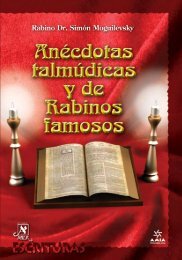Massacre, Slaughters, Stampede, Exodus,Deportation, Yeghern, 1 GenocideWhen giving descriptive narratives of their parents or grandparents our respondents usually used thewords “genocide”, “massacre”, “massacres”, “stampede”, “deportation”, “refugees”, and very rarely –words like “exile” during the interviews. When describing particular situations they used “slaughtered”,sometimes “killed”, “incinerated”, “stubbed”: “Arshak’s family was slaughtered during the genocide, therewere large-scale massacres in Baghlou”(Mushegh Gevorgyan, Dashtadem); “when the genocide started, Turks<strong>to</strong>ok his daughter and son, they were very beautiful - my grandma’s uncle’s wife was a very beautiful woman,and her one son and one daughter were slaughtered in front of her very eyes” - from the s<strong>to</strong>ry <strong>to</strong>ld by (EleonoraGhazaryan, Ashnak); “my grandma used <strong>to</strong> tell that forty people lived in one house in Mshgegh, of these forty shewas the only one left alive, all in her father’s family were incinerated, slaughtered” (Vazgren Goukasyan, Ashnak);”My parents were Armenians who were deported from Turkey, so <strong>to</strong> say, my father was from Pontic Amasia,and my mother was from the very center of Caesarea – from the Caesarea city. ... My father left Caesarea duringthe first massacres... well, so he left during the first massacre...”(Nairi Tajiryan, Yerevan); “During the 1915 massacrethey first <strong>to</strong>ok my grandpa, my grandma always used <strong>to</strong> say they stabbed him” (Nairi Tajiryan,Yerevan);”<strong>The</strong>re was such stampede, slaughter, slaughter...”, “Aunt Elmast went <strong>to</strong> America during the stampede”, “Finally,when grandpa saw this, it was already <strong>to</strong>o much of a massacre...”, “It was during the stampede, yes, on the road”( Anahit Bardakchyan, Yerevan ); “... when they killed my grandpa ... then started the stampede ... during thestampede my grandma, she was <strong>to</strong>o beautiful ...” (from Albert Mamikonyan’s s<strong>to</strong>ry, Yerevan); ”... after they didthe first slaughter ... the third slaughter was in the Der Zor desert, they drove these people far away from inhabitedareas and slaughtered them there” ( from the s<strong>to</strong>ry of Eleonora Ghazaryan, Ashnak); ”Before these massacres,before the massacres of 1915... yes, during the stampede <strong>to</strong>o he was with Aghavnik. Aghavnik was some sor<strong>to</strong>f relative <strong>to</strong> us. When coming with Aghavnik during this stampede...” (from Vardan Hakobyan’s s<strong>to</strong>ry, Norakert);”... then during the deportation he came <strong>to</strong> Armenia” (from Artak Hovsepyan’s s<strong>to</strong>ry, Norakert), etc.Sometimes they also use the words “fight”, “war” – “they died of war or what, the Turks fought, and they ranaway during the fight, but died on the way”. When asked what kind of war she means, surprised by thisquestion, the narra<strong>to</strong>r, said “the Armenian-Turkish fight; there was a war between Armenians and Turks, youdidn’t know this?” (from Tamar Poghosyan’s s<strong>to</strong>ry, Gyumri). <strong>The</strong> words “Genocide”, “massacre”, “massacres”,“stampede”, “deportation”, “refugees”, “slaughtered”, “killed”, “incinerated”, “and stabbed” aremost probably the words that were used by survivors when telling these s<strong>to</strong>ries <strong>to</strong> their children or <strong>to</strong>each other.1 “Yeghern” is the term used in Armenian language <strong>to</strong> define the Armenian Genocide.120
In the word-s<strong>to</strong>ck of the survivors the word “slaughter” is probably a translation of Turkish word “kesmek”.In the Armenian language the word “slaughter” is rarely used <strong>to</strong> indicate the killing of humans –this word is used exclusively in descriptions of the events of the genocide period. Notably, probably it isfrom here that this word entered the vocabulary of children. From her father’s memories Anahit Bardakchyantells: “my father said, “we were wandering through the pastures, there was a hill around there, we weregoing <strong>to</strong> climb it.” He tells, “I had a cousin named Helineh, and my aunt’s name was Elmast.” I have seen her picture.She was a young girl, her picture is still in front of my eyes – she had blue eyes , there are others with blueeyes in my father’s family line, with blond hair, up <strong>to</strong> here . “My father was holding Helineh’shand and we, children of two sisters, were climbing, she was wearing a white dress with beautiful volants.” Suddenly,he tells, this Helineh said “Oh my, Haroutyun, the Turks are coming.” He tells, “I held Helineh’s hand anddragged her, dragged her, but Helineh dropped my hand and tumbled, while I ran. I ran, hiding in the grass behindtrees, watching”. Helineh having lost her <strong>to</strong>ngue from fear, she said “Do not slaughter me, do not slaughter”but, he tells, “<strong>The</strong>y already <strong>to</strong>ok out the knife and I ran away, I didn’t want <strong>to</strong> see what would happen next”. SameAnahit Bardakchyan says “we also fought against them... they slaughtered our [people] but ours didn’t slaughteranyone, we just fought them like an enemy – if you fight, I have <strong>to</strong> fight <strong>to</strong>o, right?” It is clear from these sentencesthat in Anahit’s perception words “fight”, “enemy” are attached <strong>to</strong> different notions, in which theword “slaughter” doesn’t fit.From the way the words “yeghern”, “genocide” are used in the narrations it is clear that they were compiledat a later period. “My father was born in 1917 and my mother in 1920; after the yeghern their familiesmoved <strong>to</strong> Armenia...” (Aida Topuzyan).<strong>The</strong> words “massacres”, “stampede”, “genocide”, “deportation” and “yeghern” are sometimes used interchangeably,or even repeated in the same sentence: “Turks were massacring Armenians, they didn’t want Armenians<strong>to</strong> live, it was a yeghern, whatever it was, Turks did it” (Tamara Poghosyan). When telling about herrelative Silva from Gymri, who was deported from Kars, she tells “<strong>The</strong>y were deported from Kars and came<strong>to</strong> Ghoukasyan... after 1915, after the yeghern”.Sometimes, in some s<strong>to</strong>ries, you can see the diversified perception of the words “exile” and “genocide”:“....<strong>The</strong>re was no much genocide in Dardanel, since this was a large city, the genocide was more in the villages”,“<strong>The</strong>y were deporting people from Dardanel ... <strong>to</strong> waste lands, deserts...” (From Hayrapet Yazrjian’s s<strong>to</strong>ry). It isevident that here the narra<strong>to</strong>r uses the word “genocide” as an equivalent <strong>to</strong> the words “massacre”, “murder”.It is noteworthy that among our narra<strong>to</strong>rs the word “aqsor” [Arm. deportation, expulsion, exile]was only used by Avetis Keshishyan and Hayrapet Yazirjyan, both coming from Turkish-speaking Armenianfamilies. <strong>The</strong>y both didn’t speak Armenian at a young age. <strong>The</strong>y learned the language at a laterstage and apparently, their childhood memories maintained the official Turkish term, “sürgün”. <strong>The</strong>reforethey are still using the Armenian literary equivalent - “aqsor”. None of our respondents used theterm “deportation” in Armenian while referring <strong>to</strong> Yeghern.121
- Page 2 and 3:
Published by:Institut für Internat
- Page 5 and 6:
ContentsForeword...................
- Page 7 and 8:
ForewordThe project “Adult Educat
- Page 10 and 11:
Aras, Yasin Aras, Welat Ay, Cenk Ce
- Page 12 and 13:
The main audience of this book is o
- Page 15 and 16:
“Wish they hadn’t left”:The B
- Page 17 and 18:
ed by 1915 and where memories of Ar
- Page 19 and 20:
1915 tends to be represented by int
- Page 21 and 22:
Yet to a large extent, Turkish inte
- Page 23 and 24:
this, we can’t. It’s impossible
- Page 25 and 26:
een very advanced in trade and craf
- Page 27 and 28:
How to Come to Terms with Phantom P
- Page 29 and 30:
It is always you who has to be nice
- Page 32 and 33:
to the way he was raised: “They f
- Page 34 and 35:
empathize with Armenians: “My aun
- Page 36 and 37:
Adil is not the only one marked by
- Page 38 and 39:
ness may be an attempt to overcome
- Page 40 and 41:
dernity and the oral transmission o
- Page 42 and 43:
A soup pot with spoons around itAt
- Page 44 and 45:
What if My Mother is Armenian?Ruhi
- Page 46 and 47:
If I were younger I’d get baptize
- Page 48:
with butter. We’ll serve the impo
- Page 51 and 52:
The time Salih and Gavrik are worki
- Page 53 and 54:
Turkey’s changing context is refr
- Page 55 and 56:
‘It was to be expected.’ And my
- Page 57 and 58:
against one another. The feet of th
- Page 59 and 60:
Fear of Losing a CityZübeyde was b
- Page 61 and 62:
half for me.’ But what do our Mus
- Page 63 and 64:
e discussed when the kids were arou
- Page 65 and 66:
possible by the difference in relig
- Page 67 and 68:
The Charm of AraratMehmet is a 62-y
- Page 69 and 70: dogs protected the sheep against wo
- Page 71 and 72: The Story of the “Night People”
- Page 73 and 74: “I don’t know why, but my grand
- Page 75: Research in Armenia:“Whom to Forg
- Page 78 and 79: and can generally be located in Tur
- Page 80 and 81: “Whom to Forgive? What to Forgive
- Page 82 and 83: “Private Stories”After the esta
- Page 84 and 85: Recalling MemoriesOral history diff
- Page 86 and 87: In the village of Ujan, where the v
- Page 88 and 89: The home-museum of Gevork Chaush in
- Page 90 and 91: Memorial in the Ashnak village dedi
- Page 92 and 93: other regions are entirely populate
- Page 94 and 95: sources and materials for their mem
- Page 96 and 97: Ergir’s Soil is Strong, Ergir’s
- Page 98: Tatevik, the granddaughterof Mihran
- Page 101 and 102: eral meanings in Armenian -”whole
- Page 103 and 104: The Gospel with Golden Binding of S
- Page 105 and 106: keeps a copper chalice that was bro
- Page 107 and 108: In some families the passports of t
- Page 109 and 110: at that time, Mustafa and Jamal, wh
- Page 111 and 112: People were so frightened to lose g
- Page 113 and 114: naked, they were decapitating every
- Page 115 and 116: Water, Fire, Desert“There was an
- Page 117 and 118: his mother dragged him behind her,
- Page 119: Many of our narrators mention the R
- Page 123 and 124: in Kurdish villages, and helping th
- Page 125 and 126: “Well, They Are Human Too”Even
- Page 127 and 128: member this well, they said, the el
- Page 129 and 130: speak to each other. Questioned by
- Page 131 and 132: Hamze Ptshuk, survived from Hosnut
- Page 133 and 134: “I don’t Know...”Why did this
- Page 135 and 136: “My Dear Almast, Write it Down, W
- Page 137 and 138: took his rifle and ran. The dog fel
- Page 139 and 140: she didn’t tell it to me. In the
- Page 141 and 142: elder guy in this house died and hi
- Page 143 and 144: AH - Turks always killed to get int
- Page 145 and 146: “My Father used to Tell us at Hom
- Page 147 and 148: person... I have never seen him, bu
- Page 149 and 150: gotten what you knew”. So, out of
- Page 151 and 152: a paid Adult Residential Facility,
- Page 153 and 154: It was probably after 60s... My fat
- Page 155 and 156: the Vardevar 1 day . Even if we mak
- Page 157 and 158: that this wasn’t a dream... and..
- Page 159 and 160: was our historical village. Nich, I
- Page 161 and 162: just filming around myself with no
- Page 163 and 164: that person whether I could take a
- Page 165: [Turk. wife]”. In the morning I t
- Page 168 and 169: 4 Albert Mamikonyan,1953, in Kirova
- Page 170 and 171:
11 Almast Harutyunyan,1920, Ujan vi
- Page 172 and 173:
18 Eleonora Ghazaryan.1949, Ashnak
- Page 174 and 175:
26 Nairi Tajiryan,1936, Egypt (Cair
- Page 176:
33 Vazgen Ghukasyan,1933, Ashnak vi


